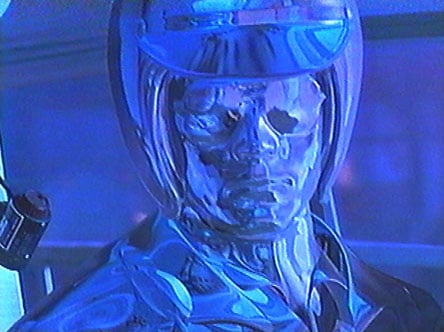This article is more than 1 year old
I'll be back (and forward): Hollywood's time travel tribulations
Quick, call the Time Cops to sort out this paradox!
Most films take a sombre view of time travel. Beings from the future will look back on our concepts of time travel seen in films as different as the Time Bandits and the Edge of Tomorrow and wonder what the hell we were thinking.

The Terminator franchise has pushed timelines further out, postponing Judgement Day until 21 April 2011
You may notice that each film seems to have their very own set of time travel rules, usually conveniently forgotten about an hour into the narrative. Whether it’s travelling to the future or the past, travellers should beware, there are plenty of paradoxes and causality violations to watch out for.
So bring me my trusty time machine (or Suzuki Vitara fatboy circa 1994 in my case) and let us travel back to 1960 to one of the first instances of time travel in film, HG Well's The Time Machine (1960). Ahead of its time (did you see what I did there?), the George Pal adaptation of the 1895 novel deals with the time traveller as (mostly simple) observer, traversing the past and then ultimately the future, and in doing so exposing the basic tenets of human nature.
Bringing a time machine into time travel complicated things because now you have to think about THE SCIENCE therein, and that’s where time travel movies tend to go downhill. Let's face it, everything was much easier when it just involved a bonk on the head, as in A Connecticut Yankee in King Arthur's Court (1949).
The Terminator franchise is all about the Grandfather paradox, and also known as The Hitler paradox
Any movies based on Charles Dickens' 1843 novel A Christmas Carol (most notably Scrooge featuring Alastair Sim (1951) and Bill Murray's 1988 effort Scrooged) are much easier for us to get our head round as, again, they don’t involve science with the need for a time machine replaced by spectral figures and supernatural occurrences.
A withering social critique and portrayal of the new urban environment, and written during the 19th century, Dickens' work has a moral compass that all the time guides the time traveller's storylines, making them perfect for celluloid adaptations.
But let’s put to one side the very complex mechanics of how one actually travels in time. There’s another problem: actually messing with time.
Pushing a timeline further and further out is something the Terminator franchise has tried to accomplish (the first two classic films made temporal sense), but seemingly failed at with the last film (so far) in the series. Let's hope Terminator Salvation (2009) represents a full stop in McG’s directing career. Judgement Day has been postponed from 29 August 1997, to 21 April 2011, apparently.
Coming soon is Terminator: Genisys (2015) from the writer of Deadwood and Madmen, and hopefully you'll find yourself transported back to 1984. The Terminator franchise is all about the Grandfather paradox, also known as The Hitler paradox, and leaves us asking what if you went back in time and killed the man who would invent such-and-such a technology so that it would never exist? What impact would that have, if any? And that’s why in 1994 we needed Jean Claude van Damme as Timecop to police the timeline.
Backwards, and forwards, and back again
Making several journeys along one timeline to preserve or change the present or future is the foundation for the Back to the Future trilogy. In the second film, despite Marty’s best efforts to preserve his own birth, he accidentally changes the future by giving Biff access to the Grays Sporting Almanac.
This establishes a new timeline for the next film where Biff has amassed a personal fortune (betting on sporting events with the outcome already known) and Marty has to travel forward to 2015, eventually managing to burn the Almanac, only to find he has to travel even further into the past to correct the timeline. These films area classic example of the Bootstrap paradox - seeing items passed from the future to the past to be passed back to the future.
